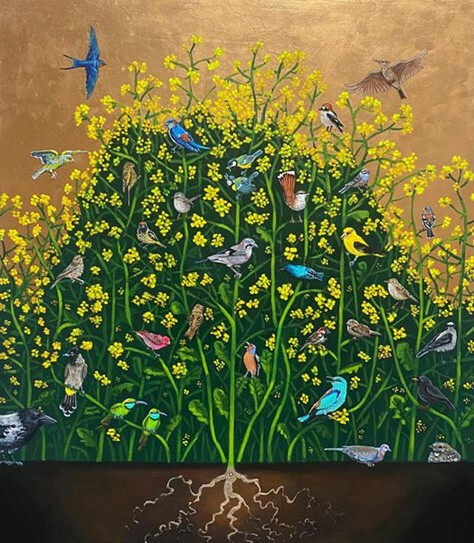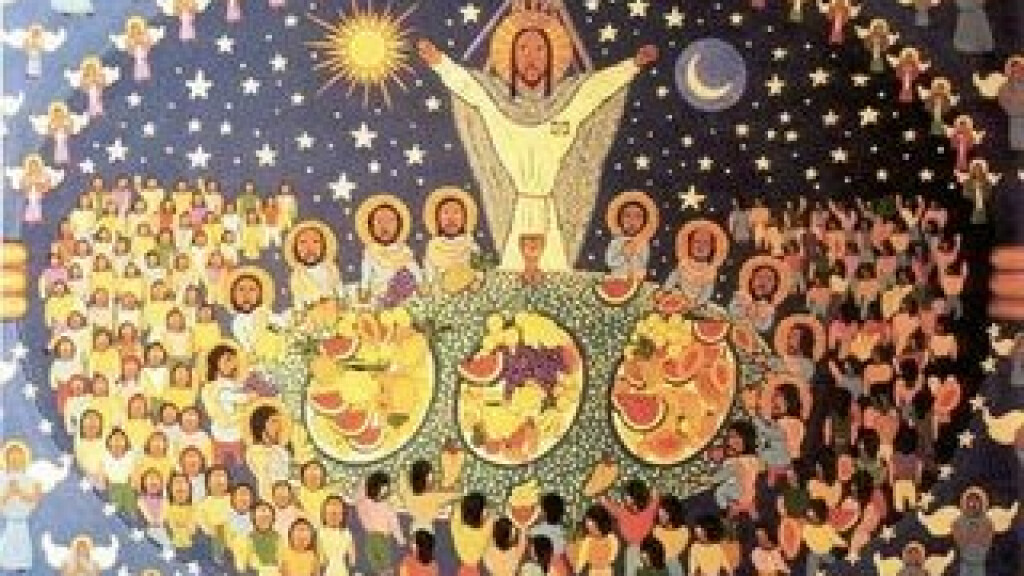September 24, 2023 | Rev. Loren McGrail
What if?
Matthew 20:1-16
Rev. Loren McGrail
Holmdel Community United Church of Christ
September 24,2023
As auto strikers join the picket lines along with other workers across America, the idea of structural injustice takes center stage. Today’s message will focus on the different ways we can view justice and what the kindom of heaven is not like.
Dear Ones, today’s message will be like looking through a kaleidoscope at the same object, the parable, but seeing different things thus understanding the parable in different ways. I am inviting you to pay attention to which “viewing” makes the most sense to you and why.
Let’s start in the place that will seem the most familiar, the one you might have heard preached before. Let’s notice the title The Laborers in the Vineyard. We are automatically set to view the story from the lens of the workers and thus, to see God as the vineyard owner.
The landowner, vineyard owner is God because God is “generous” and “equitable” with all the laborers. The last shall be first and the first last is such a godly thing to say, is it not?
In this allegorical reading the grumbling worker at the end of the story is representative of the Pharisees, chief priests and other Jewish leaders, who confronted Jesus during his life and ministry. Their legalistic insistence on the law is being critiqued in favor of a God who gives equal treatment to all the workers through unconditional generosity and kindness. We are all workers in God’s vineyard. All are valued no matter how late or soon you became a Christian. Some even preach the last as the tax collectors or the fishermen who then become disciples. Jewish New Testament scholar Amy Levine warns us that to read the parable this way with the Pharisees as the negative foil and the grumbling worker is a form of Jewish xenophobia. Dear Ones, is this how you have understood this parable? or heard it preached before?
Let’s shake the kaleidoscope and look again. Maybe you have heard this parable preached with an emphasis on the Torah Jews, the first to be hired, versus the last to be hired, the Gentile Christians. No hierarchy of first and last here in God’s realm. All are equally welcomed. Listeners of Matthew’s Gospel would have understood this message and found it either difficult or a relief to know God’s inclusive love was not based on order but available for all even those who just converted.
Our church tries to live out this message when we welcome everyone, especially those our society has deemed “the least of these.” We also try to live this out when we invite newcomers to become members and serve on committees providing all an equal voice in how we live out our mission both inside and outside the church. There is some value in reading the parable this way, is there not?
Let’s shake the kaleidoscope again. What if God is not the landowner and this is really a parable about how the world was during Jesus’ time? Or our time now? Is the vineyard owner really good? Are the grumbling workers so wrong? What if the parable is not about fairness but structural inequality and a God of distributive justice?
According to scholars William Herzog and Ched Myers, during the Roman occupation of Palestine, vineyard owners were part of the ruling elite. Family farms had been bought up by these landowners, forcing former subsistence farmers to become day laborers sometimes in their own fields to work only during the planting and harvesting seasons. Farmers often lost their fields due to increased taxes and rising tithes expected for the Temple in Jerusalem. Dear Ones, imagine this background when you hear the words remaining idle.
Knowing the laws of supply and demand, the landowner would only hire workers one day at a time, keeping the supply of workers large and thus keeping wages at their minimum. The landowner was crafty. He tells the second group of workers: “You also go into the vineyard, and I will pay you whatever is right.” (Matthew 20:3-4). The landowner always sets the terms of the business deal. Is this really how God operates?
Let’s return to our Kaleidoscope and focus on one aspect of the story. I want to turn your attention to the public shaming of the first worker who calls out the injustice being paid the same rate as the worker who just started. Why does the landowner purposely set out to provoke a negative response and then humiliate him in front of the others? Was he really so wrong to think that his hours worked were greater and deserved a higher wage? Don’t we all believe that justice is based on merit? Was the landowner being generous at the cost of being provocatively condescending? Dear Ones, the landowner knew he could go out at the end of the day and find workers because he controlled the labor system.
Dear Ones, God should not be equated with a member of a privileged oppressive class. I invite you to shake the kaleidoscope and see the parable another way. Let’s begin with the fact that our labor is needed and valued by God. The first being last and the last being first is a powerful affirming of the scales of justice.
Jesus, the storyteller, is exposing the contract between the world as we know it and the one, we seek in the kindom. I appreciate the way UCC minister Cheryl A. Lindsay puts it:
The first-last dynamic is an explicit reversal found in a gospel full of them. It’s not that the first become less worthy and the last become privileged. The good news is that we need not compete with one another to be valued. We get to participate in and receive the blessings of the kindom without respect to our contribution. There’s no seniority clause or performance appraisal in God’s economy. The rule is abundance. We need not jockey for power, position, or privileges when we all get to feast at the table Jesus prepares for us. We all find our place in a house not constructed by human hands but by the Architect of beloved community.
The challenge for us is to get over our sense of fairness and seeing it only connected to merit. It is hard, is it not, to imagine a labor economy or justice apart from basing it on reward for work. In the kindom of heaven on earth, God bases pay on something other than what is earned.
Dear Ones, I invite you to hear Maren Tirabassi’s prayer about being the noontime worker. As you place your date of entry into this church community on our collective timeline, and look to see all the history that has preceded you, are you not also a noon time worker in this church’s vineyard?
I came to the vineyard at noon (Matthew 20: 1-16)
I came to the vineyard at noon,
like so many I know –
not all that eager and early
to work the purple grape of church,
or compassionate activism,
climate change,
protests against injustice.
I'm not quite so angry
about the holy generosity to last comers,
just glad I had the joy of it –
nudged by someone who told me
of the beauty in working the harvest.
I came to the vineyard at noon,
not the last-hour laborer
(and, given the Planter of vines,
fifteen minutes
or even five would do).
I'm not quite so overwhelmed,
humbled, grateful to tears
for the blessing in my hand,
though I am glad,
for I love some people
who run hard all their lives
to make it just in time.
I came to the vineyard at noon,
and the parable is for me, too,
for I worked under the sun
but was not burned,
knew those wiser in the ways of grapes,
and those with fingers sore
from a life of trying to find sweetness
in a field of thorn,
and at end of day I held out my hand
and received everything.
If the realm of God exists on earth as it does in heaven, then what does this parable have to say to us about how to live in this world? How does it affect the way you shop or donate food? Use electricity or buy solar? Vote or make sure others can? What are the implications for granting immigration status for some and not others? Providing shelter for some but not all? For paying a minimum wage and not a living wage? What if this parable is more than about who gets into heaven? What if it is about an economy of grace where God’s redistributive justice reigns. What if it is about us joining this workforce to make sure all get enough? What if your work, your contribution was enough?
Series Information









